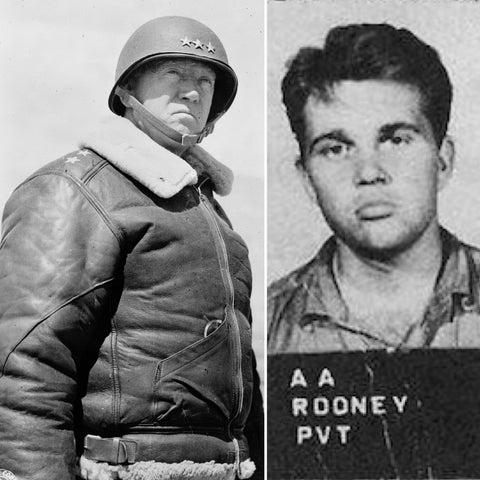
Andy Rooney’s Decades-Long Feud With George S. Patton
“Since we’re dealing with a — lower grade: You don’t have a high opinion of [General George S.] Patton,” Professor Donald L. Miller posed to Andy Rooney on Nov. 16, 2006, as part of the International Conference on WWII.
Rooney, who was taking a sip of water, nearly spit it out.
“That certainly will be the understatement of this meeting,” Rooney replied after beating back an inevitable choke.
Rooney in WWII
Rooney, best known for his cantankerous personality and cranky commentaries to boot for the CBS television program 60 Minutes, was drafted into the U.S. Army in 1941. The one-time pacifist — who quipped that he was “not enough of an intellectual to be a conscientious objector,” signed on to be a reporter for the military newspaper Stars and Stripes.
“They needed reporters and newspaper people,” Rooney told Miller. “I lied and said I was one and got the job and held on until I learned how to do it. And it was probably the single most fortuitous event in my life because I got to go everywhere. I saw the war like nobody — very few people saw World War II as I did because there was nowhere I couldn’t go.”
Because of his access as a reporter, Rooney flew with the mighty Eighth Air Force, followed troops ashore at Normandy, witnessed the U.S. First Army’s breakout at Saint-Lô, crossed the Ludendorff Bridge after the 9th Armored Division captured it, joined the triumphal march into Paris and become one of the first American journalists to write about Nazi concentration camps.
“Technically an enlisted man, correspondent Rooney was about as much under military discipline as Winston Churchill. Rooney consorted with civilian war correspondents, interviewed generals, roved about freely at the wheel of his own jeep and generally ran his own war,” writes The Washington Post.
Given almost unfettered access to some of America’s greatest military minds of the time, the opinionated Rooney did not hold back on what he thought of those men — making his disdain for Gen. Patton well-known throughout his lifetime.
Everlasting Grudge
“He was a bad general,” Rooney told Miller nearly 78 years after the war’s end. “He got too many guys killed. He didn’t take into consideration what was going to happen to the people he was sending forward. He was a loudmouth jerk. He walked around in jodhpurs and a pearl-handled pistol on each hip. I mean, for what? He was going to shoot somebody with it? No, he was a bad general.”
Two years later, at the Department of Defense’s annual Communicators of Excellence Awards ceremony, the World War II veteran continued to lay into the famed general.
“Patton was a pompous ass who cared about his mythic image above all else,” Rooney unabashedly told a room full of military officials.
In his 2008 New York Times bestseller, “My War,” Rooney echoed his previous sentiments, writing that Patton was a “loudmouthed boor who got too many American soldiers killed for the sake of enhancing his own reputation as a swashbuckling leader in the Napoleonic style.”
Yet for all of Rooney’s accomplishments as a chronicler of war, his talents as an interpreter of one are up for debate.
Rooney writes in “My War, for example, of tanks that "there's no doubt they helped win the war but of all the time and money spent on weapons, it was my experience that tanks were on top of the useless list."
According to The Post, “Not many pages later and Rooney is describing the enormous havoc leveled upon the retreating Germans at Falaise. How does he think the near-encirclement there was achieved, if not by swift-moving armored columns? Similar lack of insight crops up throughout the book, which is long on color and vividness but short on judgment and factual accuracy.”
Despite the decades-long bashing, it is Patton, however, who might have had the last laugh. Although dying in December of 1945, the general reached out beyond the grave in the form of his daughter.
In just a one-sentence letter, Patton’s daughter rebukes the former private:
“Dear Mr. Rooney, My father wouldn’t have liked you, either.”
historynet magazines
Our 9 best-selling history titles feature in-depth storytelling and iconic imagery to engage and inform on the people, the wars, and the events that shaped America and the world.
